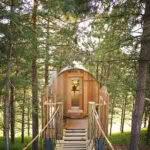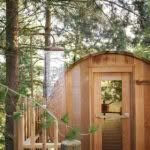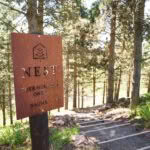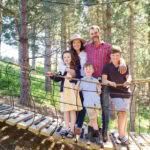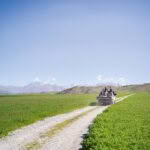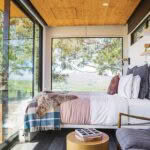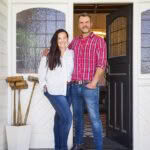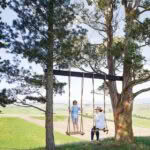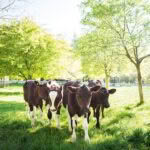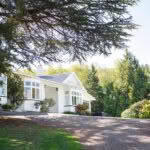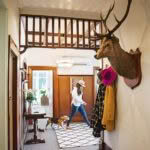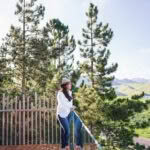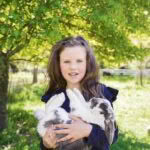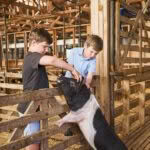Nest in the treetops: Welcome to this couple’s treetop retreat for grown-ups on their Hakataramea Valley farm
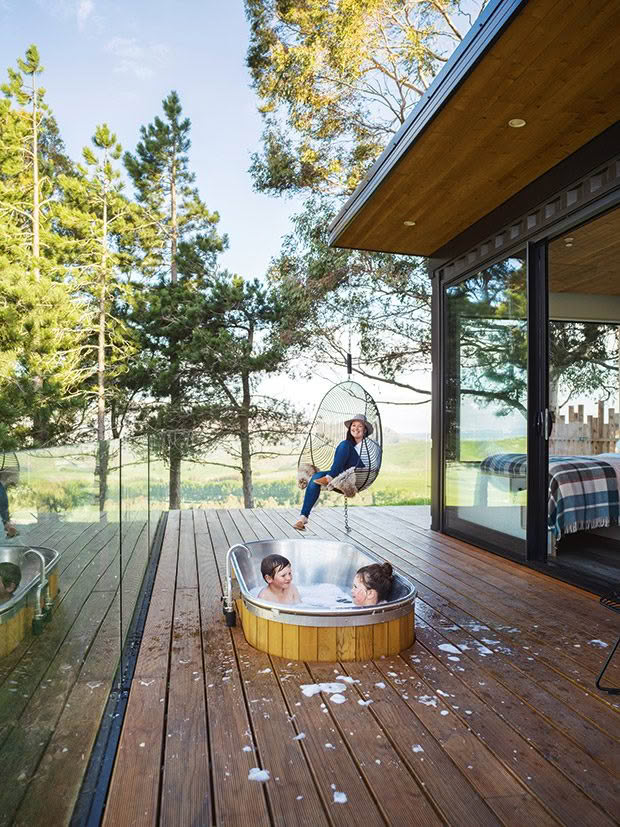
Liz Hayes likes to steal moments in the swing chair when she’s setting up her guest accommodation, Nest Tree Houses. “Let’s just say I don’t make it back to the house in a hurry.” Her children Ayla and Hugo test the outdoor bath.
Diversification was on the cards when a buzz-loving broadcaster moved to a remote Canterbury valley with a sixth-generation farmer. Million Springs farm is today host to 2000 cows and a business in the trees.
Words: Claire Finlayson Photos: Rachael Mckenna
“Elizabeeeeth!” (With all its emphasized eeees and tones of rising exasperation) was a word that rang through Liz Glass’ childhood. Usually, she was in her treehouse at the time, watching calamitous scenes unfold below.
Perhaps it was an older sister falling into a cunningly planted booby trap. (“I would put a bag of water and mud in a big hole and then cover it with sticks and pine needles.”) Or her dad finding rust on the new galvanized nails she’d left out in the rain; her parents scrambling to pick up the stashed-away banknotes she had discovered and had flung to the wind as people did in movies. She was, of course, the energetic youngest of four siblings.
“That treehouse was a magical fort that allowed me to look down on the rest of the world or spy on older siblings from afar,” she says. It was built by her dad and older brothers, and they had first dibs on it: “I was allowed in every so often, but I pretty much had to just sit quietly in the corner.”
- The property’s lofty wine-barrel sauna is set in the treetops. The sauna is made from canadian red oak: “That’s why it smells so good in there.”
As soon as her brothers outgrew it, she made it Liz-worthy and ready for hijinks. “It’s where I experimented with making flying foxes and commando bridges [which all failed]. I’d head there with a knapsack full of precious things like my View-Master and a 50-cent lolly mix. It was my favourite place.”
Three decades on, Liz (now Hayes) is facilitating a bit of that fort magic for grown-ups. She and her husband Andy recently added treehouse accommodation to their 830-hectare property, Million Springs Farm, in the secluded Hakataramea (“Haka”) Valley, just outside of Kurow.
Nest Tree Houses so far consists of one treehouse (the second will open next year), perched in the canopy of a radiata pine forest that Andy planted with his dad Garfield when Andy was 10.
- The Hayes clan (Liz, Andy, and children Ayla, Hugo and Charlie) test the mettle of the swing bridge.
- We spent a year looking at different places to build a treehouse (such as Methven and Wānaka) because we didn’t know if people would want to drive 40 minutes off the main route to our untouched little valley,” says Andy.
Getting up to this fancy Nest is half the fun — it’s accessed via another of childhood’s favourite things — a swing bridge. Should the outdoor bath not be indulgent enough, there’s a cedar barrel sauna another swing bridge away with a window that bulges out towards the tree canopy so occupants can eyeball the coniferous surrounds while flushing out their toxins.
Anyone who’s watched an episode of Grand Designs can imagine the faff involved in building a treehouse in a forest on the edge of a steep hill. “It was a battle the whole way through,” says Liz. “The engineering that needed to be ticked off was insane.”
It didn’t help that she’d been taunting herself with images of posh treehouses online. “My Pinterest pages were chocka. Andy would look at some of my pictures and say, ‘Babe, rein it in.’”
Andy adds: “I started threatening to buy some little pre-built $20,000 huts. I thought, ‘Yeah, we’ll just bring those in. Done. Bit of debt. Happy days.’” Liz groans at this. It likely sent her deeper into the arms of Pinterest.
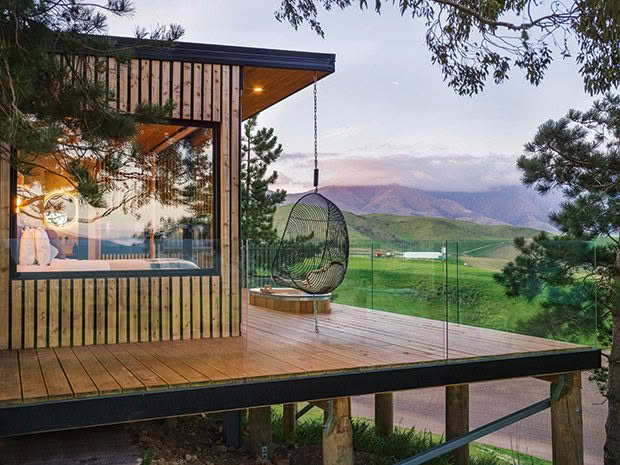
The treehouse is clad in japanese cedar and was made by Christchurch’s Shape Construction. Liz: “They were great. They said, ‘We can do this in a way that will be very like a true treehouse.’ They ensured it had a decent four-metre drop from the deck and manoeuvred it into place without disturbing its host trees.”
Googling Bali treehouse was possibly Liz’s most fatal move. “All the best ones are in Bali. There’s jack-all red tape there, so they seem free to let their creative juices flow. It’s a shame we’re so heavily regulated. At the same time, safety first — and we get that. To obtain council consent in New Zealand, your foundations can’t be the tree alone.”
A house within the trees on stilts was the best solution. “We had to dig into the side of the hill in a clay base to anchor the foundations. That treehouse isn’t going anywhere.” Also not going anywhere: the swing bridges. The engineer designed them to hold 10 elephants. “I was adamant about having swing bridges. I got questioned about it a couple of times, but I said, ‘Andy, trust me. We need the swing bridges.’”
So what does Garfield make of this bit of whimsy lurking in the practical pine forest he planted? “I reckon he thinks his son and daughter-in-law are quite mad,” says Andy. “I think we probably have been.”
- The interior of the first treehouse was an exercise in tiny-house cunning. There’s a sneaky television that hides in the ceiling but the floor-to-ceiling views of the Haka Valley tend to get higher ratings.
Million Springs has been in family hands since Alphaeus and Anna Hayes arrived from Canada and bought the land in 1878. It was a beef and sheep farm until Andy and Liz took over. “Within the first four years, we’d shifted to dairying, so when we said we were going to build a treehouse for accommodation, it probably completely blew Mum and Dad’s mind.”
It took Liz a while to find her Million Springs feet. Andy calls her a “halfie”: one foot in town, one on the farm. She already had good gumboot cred.
Growing up in Christchurch, Liz and her siblings raised calves in the back paddocks, which were then sent to the family’s beef and dairy farms in Methven. (It was there that she first met Andy when he was doing a dairy stint for a degree at Lincoln University.)
But interest in journalism kept Liz city-side: “Growing up, I was fortunate to be able to dip into both worlds, but I picked the urban world to follow a career in broadcasting.”
- Liz and Andy in front of the family homestead. When Andy chose to do work experience at Liz’s parents’ farm for his Lincoln degree, his motives were not especially cow-centric. Says Liz: “He’d heard that there wasn’t much dairying involved (he didn’t like dairying) and that Dad had two daughters.”
- The swings on the farm were built by Andy with vital supervision from Ayla.
- Andy’s life is now very dairy-involved: 2000 cows’ worth of involved. The calves pictured (Ricky, Rusty, James and Paula) are the kids’ pets.
In the early years of their relationship, Liz was busy building her career as a reporter (for TV3 and Radio LIVE) while Andy was inland on the family farm. “It got tricky,” she says. “We tried to break up — for a day.”
After seven years of long-distance love, the pair was keen for some proximity. Andy upped sticks and moved to Christchurch to be with Liz and initially found a job in a plastics factory. That this Lincoln graduate was prepared to walk away from the family farm and fold plastic for a bit made him even more of a keeper in Liz’s eyes.
She proved pretty keeper-ish herself several years later when Andy’s dad beckoned them back to the Haka Valley. When they took on Million Springs in 2009, Liz was pregnant with their first child, so her world was already in flux. Add to this the remote location of the farm and no wi-fi.
- The family homestead, built in 1880, has been extended and refashioned by generations of Hayes over the past 140 years.
- Dudley, the beagle, knows all the best snooze spots.
“In a way, I felt like my world imploded,” she says. “Everyone here was very welcoming and warm, but it wasn’t who I knew or what I knew. And my career was gone.
When women have babies, they lose a part of their identity, and it’s a real struggle. I’d stripped my entire life away. I felt fortunate to have met the love of my life, but I couldn’t see the wood for the trees. Andy was MIA building our future [changing from sheep and beef to dairy]. It was a massive life adjustment.”
Liz’s city friends weren’t keen on losing her either. “They’d say, ‘What are you doing? When are you coming back? We like Andy — he’s awesome — but can’t he move here?’ They said if I started wearing pearls and moleskins, they’d defriend me. I haven’t done pearls yet…”
- Portraits of two of Andy’s ancestors, Norman and Alpheus Hayes. Alpheus sealed the fate of his descendants when he tossed a coin on a Glasgow wharf back in 1871 to see if he should board the ship back to his homeland in Nova Scotia or the one to New Zealand. The coin decreed he board the latter, where he met fellow passenger and future wife, Anna.
More than a decade on, that Haka isolation has proved to be the grit in the oyster; it’s the very thing that makes Nest Tree Houses so appealing to city-frazzled guests. “That’s one of the coolest things — everything that used to work against this place for me is now working for this little business,” Liz says.
It also gives her a business to grow while Andy focuses on the farm’s 2000 cows. “We had to diversify,” she says. “We call it our colourful secondary-income stream. It’s such a small part of our business, but it’s the fun, noisy part. It’s great to see it bringing a bit of joy to others. That’s what life’s about — bringing a bit of joy.”
- Ayla holds Cuddles the bunny while Iggy the pig gets a good ear scratch from Charlie and Hugo.
- Liz says: “The kids love their pets. Charlie is our big farm boy — he never misses a chance to get out on the farm with Dad. Ayla loves animals, and Hugo is just learning the ropes but loves being out on the tractor. They’re more fully farm-blooded than me, I think.”
Asked what their three children — Charlie (10), Ayla (8) and Hugo (6) — thought when their parents started building a treehouse that wasn’t for them, Liz says: “They were totally bummed.” They’ve since been granted two nights each in the treehouse during lockdown, though, so that should be enough to thwart a coup.
As for Liz’s brothers, she tried to get them to concede that her new treehouse is far better than the one they built all those years ago: “I had a typically minimal response. They laughed and then took credit for the inspiration.”
LIZ’S NEST TREE LESSONS
Biggest lesson: “Back yourself. It’s so easy to second-guess your ideas, your concept, and your dreams — especially when you’re building a treehouse on a farm in the middle of nowhere and know nothing about the hospitality business. You have to put the work in and truly believe in your concept.”
Biggest hurdle: “The consent process, the engineering — the whole build. The hurdle that almost toppled me was the swing bridge [the intricacies of engineering and construction]. We had to get specially thick wire ropes made and sent up from Dunedin. They were costly and time-consuming [especially when they finally arrived and were the wrong lengths].”
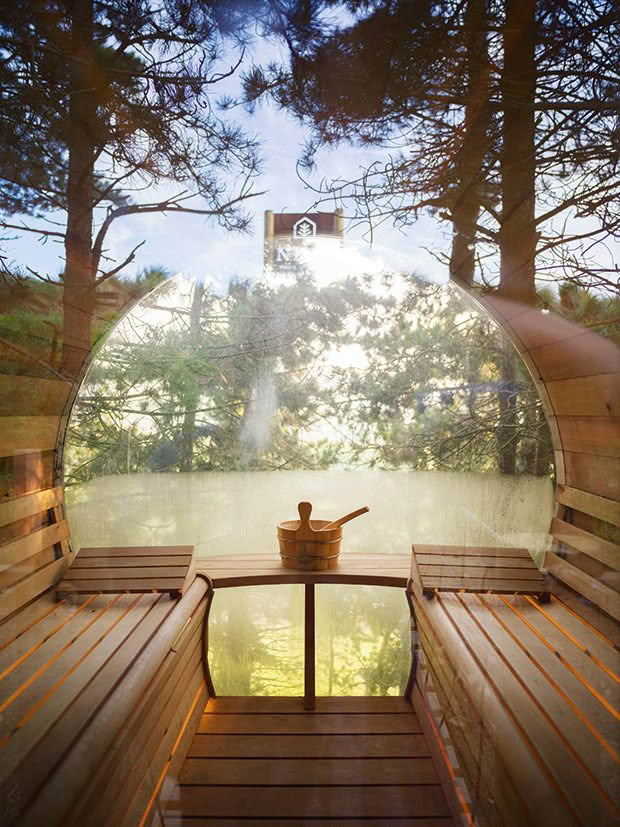
Best decision: “My biggest frustration was also one of my best decisions: standing my ground on the swing bridge. It was discussed on several occasions whether it was needed. I’m glad I stayed firm on it because it really adds to the colour and fun. Also, the sauna. We got the idea from one of our seasonal backpackers who had one at his home near the French Alps. I was never a sauna human, so it was a bit of a risky decision, especially as we had to import it from Canada. But I love it.”
Worst decision: “Not to build two treehouses at the same time. We initially got consent for two but didn’t have the confidence to go all in. We thought this was wise and conservative — but it now means we have to build between guests.” nesttreehouses.com
MORE HERE
